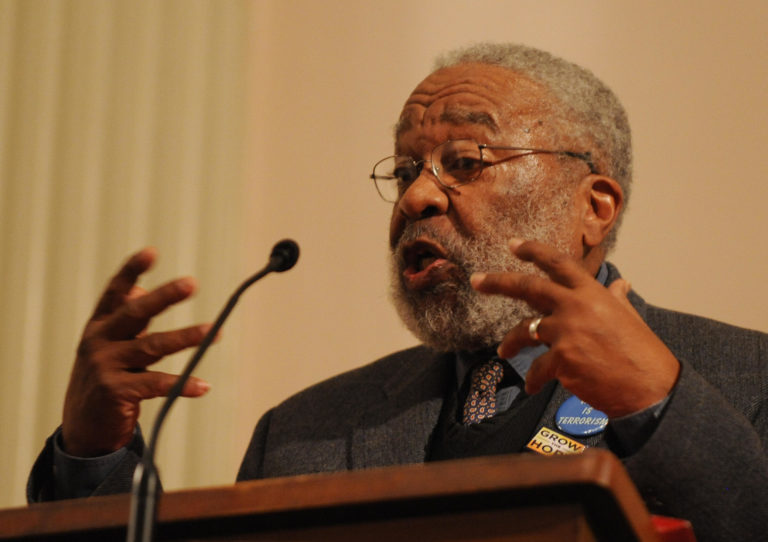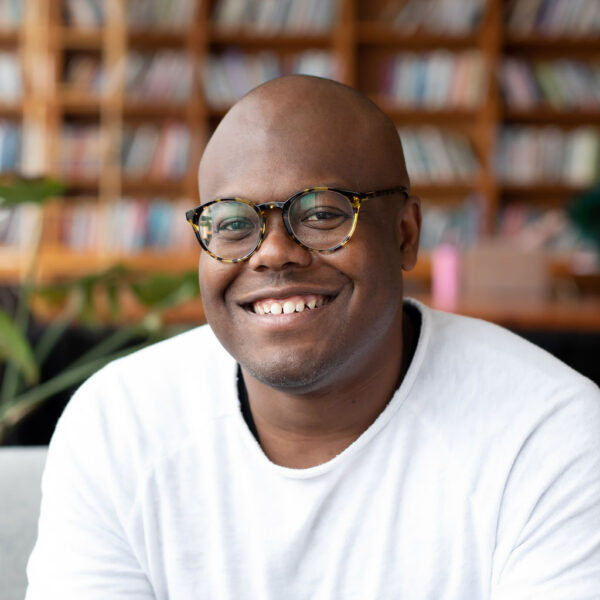
Image by Mark Ralston/Getty Images, © All Rights Reserved.
Uncle Vincent, A Man Who Could See
Vincent Gordon Harding’s death is being grieved and his life is being celebrated all over the world. From courageous activists in Palestine to visionary leaders in Detroit, to the young men and women of the Atlanta University Center, there are thousands of people who will never be the same because of his life and his willingness to live it faithfully, earnestly, and lovingly.
This man of Harlem and the South Bronx, this son of Mabel Lydia Broome named Vincent Gordon Harding was a gift. Through tears I give thanks to God for him. Through tears I give thanks for being seen by him, known by him, and loved by him. To describe what he meant to me in the brief time I knew him seems impossible, but I can attempt to testify to a grace-filled life that I knew and saw with my own eyes.
It’s not only that he could recall for us the visits to brother Martin’s body at Sisters Chapel or the conversations he had with “Jimmy” Baldwin about American democracy; that ability to recall was a great weapon against this forgetful and alienating culture. Against the alienation, against the dismembering, Uncle Vincent had another power too — he could remember. And by remember, what I mean is that he could see. Or rather, he had the gift of sight that must have been passed down from the Spirit that so permeated his life and community.
Amid so much blindness, this gentle man could see. He could see us, each of us whom he encountered. He did not see the caricatures of ourselves, not what our ideological commitments had made us, or our fear had tricked us into becoming. He could see in us who we were destined to be: more fully human. And he used his gift of sight to help us see ourselves and each other.
He helped us to remember, not just from where but from whom we had come and to whom we belong. This country, this world, can be so splintering, so alienating, and mean, especially when one is young, when one is black, when one is gay, and when one has been wounded in the many battles for freedom in this, his home country with countless ways to imprison one’s soul. By pointing behind us, to a man killed years ago, he helped us to see forward. By helping us see within us, to the love we have attempted to kill, he helped us see beyond.
There was strength, a remarkable strength, even until the end of his life in a hospital in Philly. This was a man who knew how to wrestle: with difficult questions, with powerful adversaries, with fear, with life, with death, and with God. Though I am still crying, I cannot help but give thanks for the gift he was. This remarkable, beautiful man loved me and showed me how to love others more deeply, more consistently than anyone I had seen before. I called him Uncle Vincent, and he was known and loved by my family. I have to give thanks to his family who shared him lovingly with so many and I am grieving with them.
Many of us are trying now to do what he told us to do after every phone call or encounter: to be strong. His encouragement of strength was not a sentimental phrase to be spoken, it was a real sending forth, given in hope and wisdom born of years in the struggle.
He knew that the work that we are called to do, the work of” building up a new world” as he sang it, requires strength. It requires strength beyond which any one person can possess. We have to be strong. It may be that a bullet will take our lives when we are young, but ”be prepared to be in the struggle for 50, 60, or 80 years he told us.” Are you ready? I can hear him asking, Are we ready?

Share your reflection